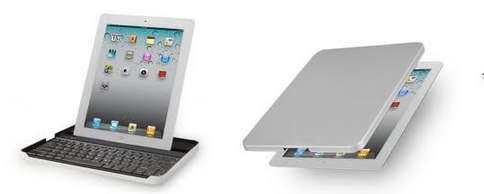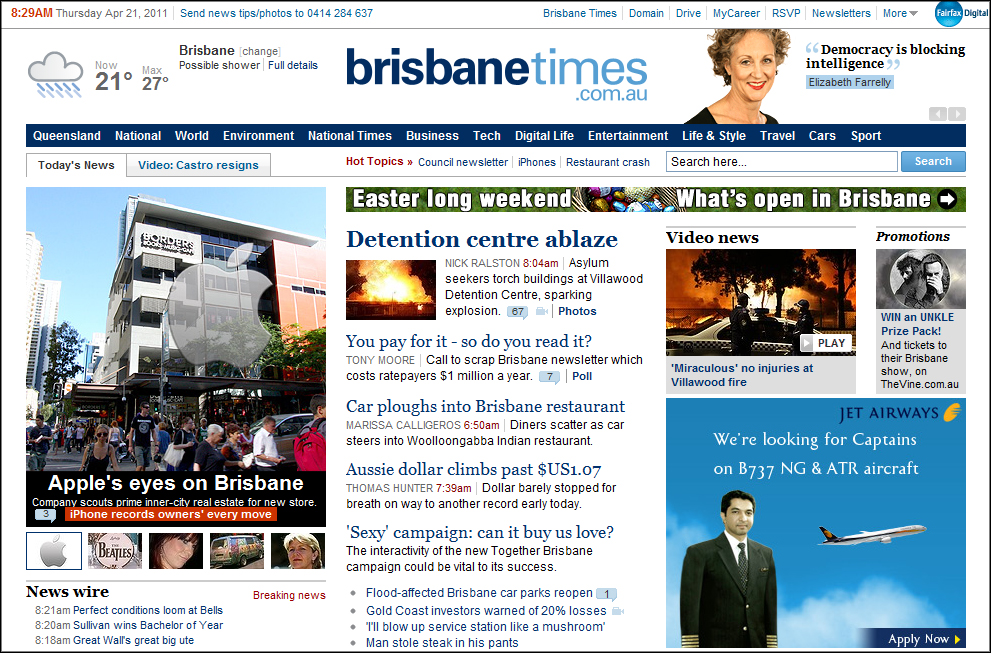Apple breaks silence on iPhone tracking
PLUS: The ultimate iPad 2 case | Seagate and Samsung | Business media sponsorship gone wild
PLUS: The ultimate iPad 2 case | Seagate and Samsung | Business media sponsorship gone wild
UPDATED THURSDAY, APRIL 28: Apple has broken its silence on the iPhone tracking issue.
In an interview with The Wall Street Journal today, chief executive Steve Jobs said a software bug had led to the iPhone recording a user's movements (tied to time stamps) in an unencrypted database, even when location-based services were switched off.
The bug had only been discovered in the past few days.
A fix will be released in a few weeks that will limit recorded movements to seven days when location services are turned on, and truly disable the feature when it's turned off.
Apple gathers information from the phone about nearby cellphone towers and local wireless, or wi-fi networks, Mr Jobs said. Apple uses that information to build a database that it then uses to quickly locate phones for services like maps.
iPhone secretly tracks where you go, and when
THURSDAY, APRIL 21: Many smart phone users will be aware that a lot of GPS-capable mobiles sold today have "opt-in" location-based services.
But today, The Guardian has alleged that Apple's iPhone always records your movements regardless, and ties them to a time-stamp.
Just imagine if a thief or, say, a jealous spouse, found your phone and accessed the file, the UK paper says.
"The iPhone system appears to record the data whether or not the user agrees. Apple declined to comment on why the file is created or whether it can be disabled," the Guardian reported this morning.
This free, open source app by Pete Warden reveals the infomation Apple has been recording about your movements.
Here's what Lance Wiggs found after installing it - it turns out poor mobile network coverage affords a measure of privacy:
It seems an iPhone records your location in terms of the nearest celltower - meaning your actual location could be hundreds of metres away, masking where you actually work or live - even if a prying partner can still track your movements by town and suburb.

Want want want
Personally, I've found the iPad 2 Smart Cover sold by Apple (for $120 in its leather version) too fiddly.
Here's an attractive-looking alternative, the Logitech Keyboard Case by Zagg ($US99, launching this month), made from " precision-cut aircraft-grade aluminum" with "high density padding on the inside".
(Question: why doesn't Logitech make more of the fact it's a Swiss company?)
It looks solidly engineered, and you get the convenience of a keyboard (true, you could go the whole hog and get a MacBook Air, but then you lose the choice to go tablet-only at times).
No word yet on local release.
Business media sponsorship gone wild
I know, I know, I can't talk - my column in NBR's print edition is sponsored by Telecom.
Still, I will.
It really bugs me that AMP livery has totally taken over the Twitter Avatar for TVNZ's morning show AMP Business.
Throw in a story about AMP itself, and you get a tweet - from this morning - that looks like this:

Leaving aside the issue of perception of editorial neutrality, on a purely practical level it's hard for the casual Twitter user to even discern this is a TVNZ tweet about a news story.
A Fairfax Auckland site?
NBR has previously reported that Fairfax will launch an Auckland-specific website, separate from Stuff, with Miriyana Alexander as editor.
Today, the Herald published similar speculation. Assuming two pieces of gossip equal fact, a launch must be close.
Fairfax's model is its web-only Brisbane Times, which is refreshing for readers with its lack of intrusive advertising (or indeed almost any advertising) but which seems quite heavily dependent on stories repurposed from the Sydney Morning Herald and other papers in the Fairfax group.

Toward hard drive-less laptops
Earlier this week, Seagate said it would buy Samsung's hard disk drive business for $US1.76 billion.
More importantly, Seagate will get access to Samsung's Flash memory technology - crucial at at time when so-called solid state drives are just starting to make inroads in the laptop market (think of a solid state hard drive as the same as the memory card in your digital camera or phone - only with more capacity and a bunch of expensive electronics attached).
Smart move. When I bought a laptop recently, I chose one with a 250GB solid state drive. It's smaller, quieter, cooler and faster at loading software than a hard drive. And because there are no moving parts, it's much more reliable.
One drawback is that solid state drives (SSDs) are still expensive. Deals like this will help deliver economies of scale. Eventually. In the meantime, if your budget's tight, consider buying a small capacity SSD that you use to load Windows, and your core apps, while keeping most of your data on a hard drive.
Sign up to get the latest stories and insights delivered to your inbox – free, every day.